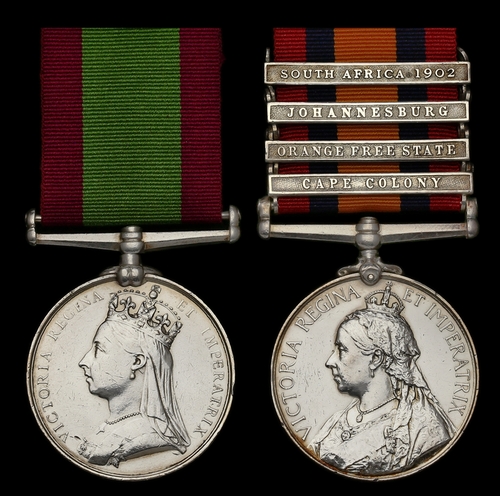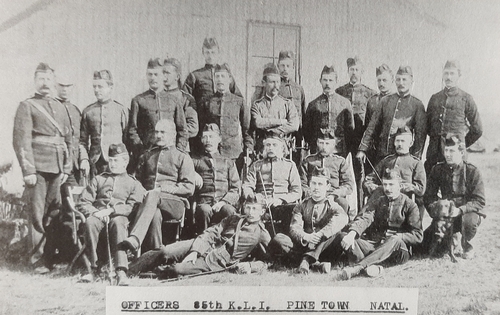Auction: 25002 - Orders, Decorations and Medals
Lot: 90
Pair: Colonel Sir A. H. J. Doyle, King's Shropshire Light Infantry, 4th Baronet of Buscombe, 'an aristocrat of the Old School' who was 'mentioned' in 1901 and later commanded 2nd Battalion during the final stages of the Anglo-Boer War
Afghanistan 1878-80, no clasp (2nd Lt. A. H. J. Doyle. 85th Foot.); Queen's South Africa 1899-1902, 4 clasps, Cape Colony, Orange Free State, Johannesburg, South Africa 1902 (Major. A. H. J. Doyle. 2/Shrops. L.I.), contact marks, contact wear overall, nearly very fine (2)
M.I.D. London Gazette 10 September 1901.
Arthur Havelock James Doyle was born at Clifton, Gloucestershire on 25 February 1858 the youngest son of the well-known poet, Professor Sir Francis Hasting Charles Doyle, 2nd Baronet Buscombe. Interestingly his grandfather was also a soldier, Major-General Sir Francis Doyle, his grandfather on his mother's side was the M.P. Charles Williams-Wynn. The younger Doyle was educated at the Royal Military College, Sandhurst, where he earned recognition for his study of fortifications. Whilst there he developed his language skills, becoming fluent in both French and German.
Commissioned 2nd Lieutenant with the 85th Foot on 30 January 1878 he travelled with the Battalion to India on 19 September 1878. Whilst they were stationed there the War in Afghanistan which had appeared won flared back into life with the storming of the Kabul Residency. The King's Shropshire Light Infantry were posted to the Kurrum Valley field force and there took part in the Zaimusht Expedition.
The Zaimusht tribe lived above the Kurrum Road, the Battalion formed part of a punitive expedition force them into compliance and prevent them attacking British supply lines. They climbed through the narrow passes and Hills, finally succeeding in storming the mountain fastness of Zawa in which the tribe had taken refuge, this action (in which Doyle took part) effectively ended the tribes' resistance.
Doyle must have performed well during the war because he was advanced Lieutenant on 19 July 1880. Still with the Battalion the next year he was with them when they were posted to Natal on 8 March 1881, serving with the Natal Field Force there until 7 December. Returning to Britian they were amalgamated with the 53rd Foot to form the King's Shropshire Light Infantry. Doyle was advanced Captain in this newly formed unit on 21 June 1885.
The next year he attended the School of Instruction and completed a course in Musketry which saw him acquire a first class certificate. Still in Britian Doyle left the Regiment to pursue staff work, finding himself appointed as A.D.C. to Prince Edward of Saxe Weimar, then the G.O.C. Forces in Ireland on 2 February 1887. He held this position for three years during the fraught political turmoil caused by the Home Rule debate however Doyle eventually returned to his Regiment on 30 September 1890.
Advanced Major on 19 August 1897 he was still serving in this role on the outbreak of the Anglo-Boer War. Doyle did not immediately join his unit in South Africa but was posted to join 2nd Battalion in the Spring 1900, when they were in the Orange Free State. Reaching them in May he was present for the hard fought action of Houtnek, where they received high praise for their action. Further fighting followed in April and May on the Vet and Zand rivers.
This was followed up by Operations in the Transvaal from May-June 1900 including actions near Johannesburg and Pretoria which continued into November and included the action at Elands River. Finally he joined the unit in the Orange River Colony from May 1900 where he again saw action at the Rhensoter River. Doyle is believed to have left South Africa in late 1900 and returned in 1902 explaining the lack of King's South Africa medal and his entitlement to the South Africa 1902 clasp.
Advanced Lieutenant-Colonel on 11 February 1902 he was appointed to command 2nd Battalion during the closing stages of the war. The year after the fighting ceased he led them to India where they served for several years with Doyle being promoted Brevet Colonel on 11 February 1905. The next year he laid down command and took half pay from 11 February 1906, being appointed Colonel Commanding the South Wales Border Volunteer Infantry Brigade on 1 June 1906.
Doyle officially retired on 8 May 1909 however this was not to last as he returned to an official position on the outbreak of the Great War. Appointed to command the Regiment Depot at Shrewsbury, in this role he contributed to the Battalion history in the chapter titled The Depot, which notes a number of issues with supply of even the most basic items like attestation papers in the earliest days of the war. His struggles encapsulate the spirit of the volunteers and constant struggle with bureaucracy faced by the recruiters:
'The supply of attestation papers was soon exhausted. The War Office was written to, and telegraphed to, and replied that there were no supplies available, and that they were to be written out - not very helpful. A copy was sent down to a local printer, who printed 2,000 copies in about sixteen hours at a very moderate rate. The Government contractor, a week later, wrote that unheard-of penalties could be inflicted for this breach of regulations, but no notice was taken. War Office inspectors were exceedingly complimentary at the way this difficulty had been met.'
Notably Doyle's MIC notes no entitlement to any medals for his service in the Great War, only a silver war badge. He retired finally after that, taking a well earned rest and writing a book entitled '100 years of Conflict, being a Record of 6 Generals of the Doyle Family'. He inherited the baronetcy on 21 February 1933 upon the death of his brother, holding it until his own death at Boscombe, Hampshire on 19 February 1948.
Doyle's obituary in the Regimental Journal portrays him as an interesting and lively figure, stating:
'It is neither fair to his memory to appraise Author Doyle's military qualifications by modern standards, nor easy for one who was twenty years his junior to assess his merits on sincerity. For he joined the original 85th King's Light Infantry in 1878, in the latter half of the Victorian era, when it was not fashionable to betray any undue keenness or enthusiasm for the art military; and he would have been the first to disclaim with a quiet smile any implication that as a soldier he was either distinguished or ambitious. He was, in fact, too kindly, too easy going, to be either, though he succeeded in commanding the 2nd K.S.L.I., a fine battalion. During four years in India, under the exacting eye of the then Commander-in-Chief, Lord Kitchener, with whom, he was on terms of easy friendship. But it is both a pleasure and a privilege to depict him as the man whom all loved for his unfailing charm, kindliness and perfect courtesy, and as what he invariable was at all times, namely, the perfect gentleman. I feel that, had he taken the trouble to qualify, he would have made a consummate diplomat: for he was always perfectly at east in any sort of society from that of Royalty downwards, and he remained completely serene and unruffled under all circumstances of exciting, strain or danger. It may seem strange that he made no effort to excel in any form of sport but what would no doubt have been regarded as a handicap to the ordinary officer was never mentioned in disparagement of Doyle. In short, he was tacitly accepted by all at his face value, to which athletic prowess could make no contribution namely that of an aristocrat of the "Old School".'
He was survived by his son, Captain John Francis Hastings Doyle, the last Baronet of Buscombe; sold together with copied research.
Subject to 20% VAT on Buyer’s Premium. For more information please view Terms and Conditions for Buyers.
Sold for
£2,100
Starting price
£240







